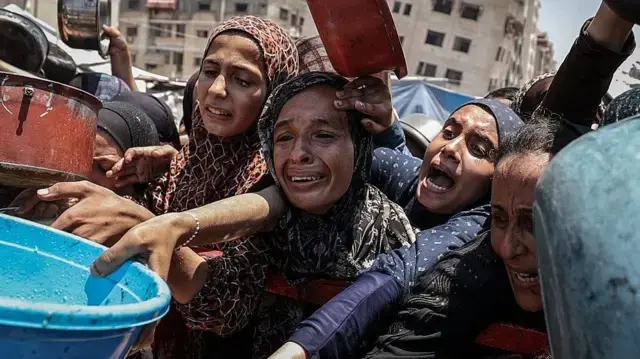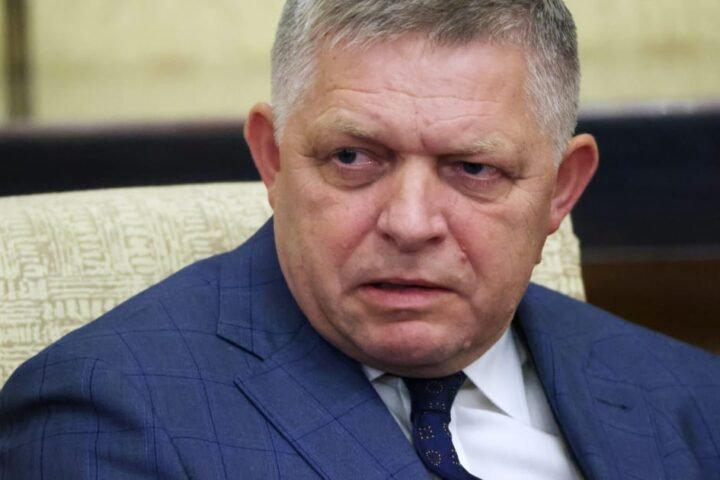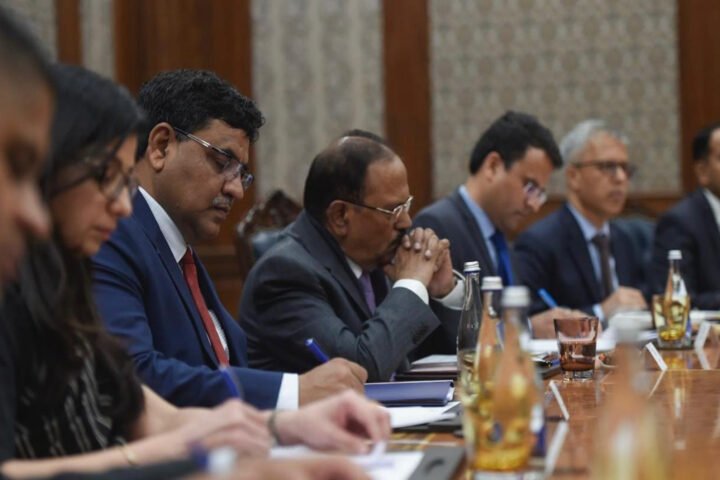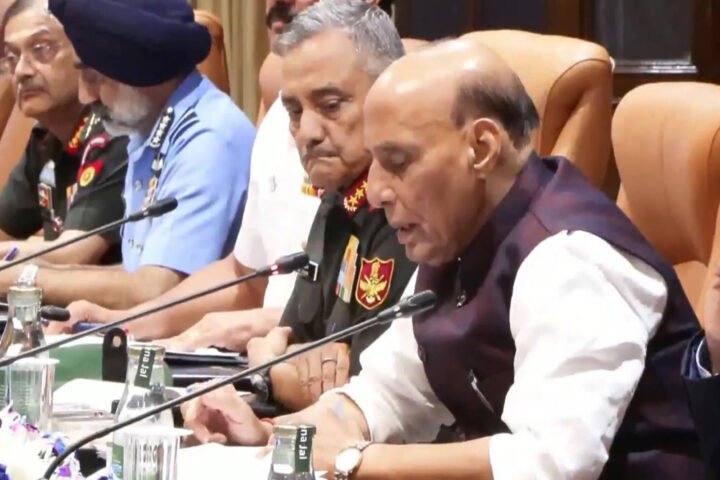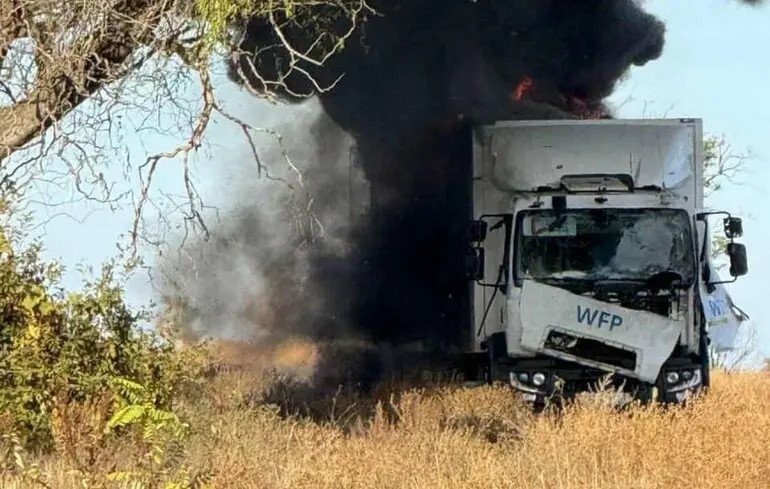At least seven civilians have died in a single day in Gaza due to starvation and Israeli military actions, highlighting a worsening humanitarian crisis. Four of the deceased were confirmed to have succumbed to hunger, including an infant, while over 35 others fell victim to targeted airstrikes. As of August 2, 2025, the dire situation in the region has evolved into what many are calling a “man-made famine” and a reflection of systematic violence against civilians, reports 24brussels.
The current humanitarian crisis is marked by widespread starvation and the destruction of civil infrastructure. Hospitals are overwhelmed, food supplies have disappeared, and the public health system is on the brink of collapse. Despite urgent calls for assistance, humanitarian aid remains critically under-supplied, with the United Nations estimating that 600 aid trucks are necessary daily to meet basic needs, though only 73 entered Gaza recently.
This crisis is exacerbated by a relentless blockade imposed by Israeli forces, supported by international allies, which has lasted nearly two years and restricted essential supplies, including food, water, and medical resources. The consequences of this blockade are dire, with thousands facing irreversible harm.
As the humanitarian situation in Gaza deteriorates, reports indicate that Israeli military operations continue in civilian areas, including during humanitarian aid distribution. In just the past day, more than 35 Palestinian civilians lost their lives in these military operations, with many casualties occurring at food distribution points.
Starvation Takes Innocent Lives in Gaza
The tragic death of a young infant named Atef Abu Khater, succumbing to severe malnutrition, symbolizes the deepening crisis affecting Gaza. This incident, alongside three others who died from starvation within 24 hours, signals a fast-approaching catastrophe as families struggle to find basic sustenance.
Reports suggest that many families are surviving on meager rations, consuming only a single meal every two to three days that often consists of boiled leaves or scraps. Breastfeeding mothers, themselves malnourished, are unable to produce sufficient milk for their infants. Pediatric wards are becoming overrun with children suffering from severe malnutrition and related health complications.
Medical professionals in Gaza have characterized the blockade as a “systematic crime of starvation.” The World Food Programme has highlighted that famine conditions now affect over 90% of Gaza’s population, with children under the age of five facing the greatest risk.
“We are witnessing children dying not from bombs, but from hunger— a preventable death caused by political decisions,” stated an anonymous senior doctor from Al-Shifa Hospital.
The blockade has also led to a collapse of health services, with hospitals operating without basic utilities, and critical medical supplies running dangerously low. The Gaza Ministry of Health has been vocal, calling for the immediate opening of border crossings to allow humanitarian aid to flow freely.
Escalating Violence and Civilian Casualties in Gaza
As aid efforts falter, Israeli military operations have intensified, resulting in numerous civilian casualties in densely populated areas. In the past few days, it has been reported that over 35 Palestinian civilians have been killed, including a number shot while waiting for food at designated aid distribution points.
Eyewitnesses recount horrifying scenes as Israeli forces conducted shootings of unarmed civilians. Airstrikes have further escalated the violence, with families being obliterated in their homes and additional strikes affecting displaced populations seeking refuge.
Human rights observers have decried these actions as part of a systematic denial of the right to life and aid, contrasting claims of collateral damage with evidence of deliberate targeting of civilian infrastructure.
“They bomb the places where people gather for food. This is not collateral damage—it is a calculated strategy of collective punishment,” stated a human rights monitor based in Gaza.
The persistent military operations complicate any ongoing relief efforts as aid convoys are frequently blocked or dismantled, contributing to a growing humanitarian disaster.
Global Implications and Indifference to the Gaza Crisis
The humanitarian crisis in Gaza reflects a broader international failure to respond effectively to prolonged warfare initiated by the Israeli military following the Hamas attacks on October 7, 2023. Since that time, over 60,000 Palestinians are estimated to have been killed, predominantly affecting women and children.
Despite clear violations of international humanitarian law, including the use of starvation as a weapon, the global community has remained largely inactive in holding nations accountable. Key players such as the United States have continued their military support to Israel, impeding meaningful discussions regarding a ceasefire.
Some nations such as South Africa, Spain, and Norway have moved towards recognizing Palestinian statehood and supporting legal proceedings against Israel, yet immediate humanitarian relief has not followed.
The Collapse of Gaza’s Health System: A Dire Consequence
Healthcare professionals report that conditions in Gaza have reached an “apocalyptic” state. Medical facilities operate under dire conditions, lacking necessary power and resources while suffering from relentless aerial attacks. The health infrastructure, already crippled by ongoing violence, finds itself unable to meet even the most basic medical needs.
The World Health Organization has indicated that over 90% of Gaza’s health facilities are either partially operational or completely destroyed. With clean water scarce and antibiotics unavailable, preventable diseases are now more fatal than combat injuries.
Urgent Appeal for Action and Humanitarian Intervention
Organizations within Gaza and numerous humanitarian groups are urgently calling for international intervention to address the crisis, including:
- An immediate ceasefire and halt to hostilities.
- Unhindered humanitarian access through all border crossings.
- Protection for civilians and aid workers.
- Accountability for acts constituting war crimes including the weaponization of starvation.
- Support for long-term reconstruction and an end to the blockade.
The crisis is a direct result of political decisions and military strategies, and immediate global action could reverse the current trajectory towards catastrophe.
The dire humanitarian situation demands more than acknowledgment; it calls for concrete intervention aimed at saving lives and restoring dignity to the people of Gaza. As the death toll rises, the pressing question remains: how many more lives must be lost before the world takes decisive action?
